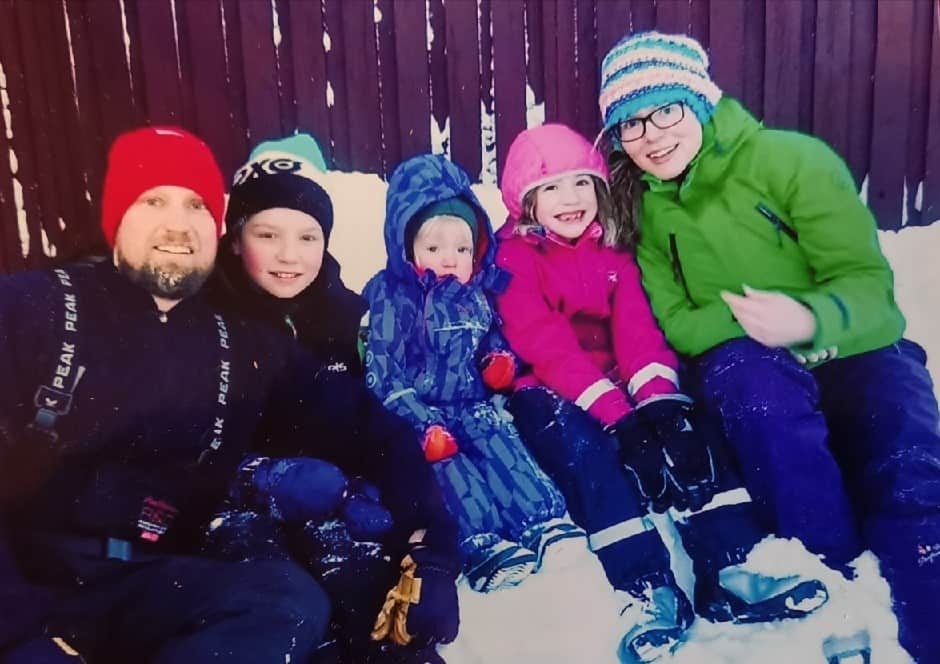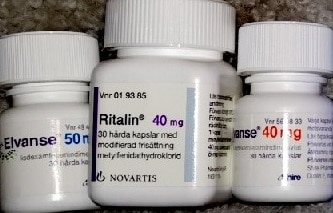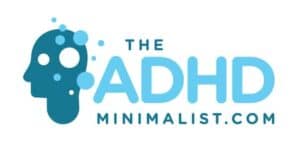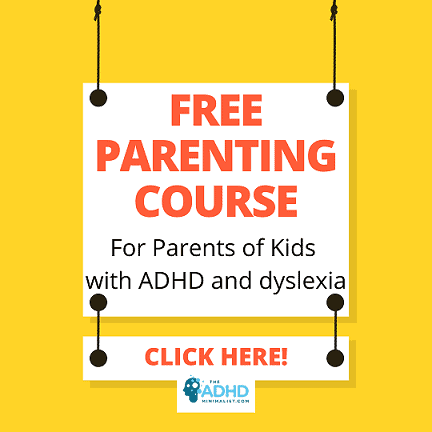
When my son was first diagnosed with ADHD (predominantly hyper) the idea of giving him medications scared me.
I first tried vitamins and Omega-3 as an alternative to traditional medication.
This helped for a while, but the vitamin approach couldn’t cope with the demands of school when he started 4th grade. My son Lage was in the third grade when he was first diagnosed, and is now finishing the 6th grade. I was finally forced to let him try medication.
I am originally from the USA, but I met my husband 17 years ago in Sweden and have since moved to Sweden permanently. My husband and I have three kids, two of which have ADHD and dyslexia diagnoses. Lage the oldest is thirteen, Our middle child Maria is ten and has ADHD predominantly inattentive, and our youngest Frida is five.
We have gone through the Swedish medical system for my son’s diagnosis which is more thorough than the American process for diagnosing ADHD.
Hopefully, the longer diagnosis process in Sweden protects children from being misdiagnosed.

Why would any parent want to give their child a stimulant or even a non-stimulant ADHD medication?
There is controversy surrounding many ADHD medications, but the fact is that ADHD medications do help kids concentrate better in school. Unfortunately, it is often a grueling process to figure out which medication works for your child and what dosage he/she responds to best.
Finding the right ADHD medication can be like walking a tightrope between a calmer child and a child who has emotionally flatlined.
No one wants to turn their child into a zombie because they are giving him or her too high a dose.
My son’s teachers during grades 1st through 3rd had the patience of saints! They worked with Lage on social skills and school work even before he was diagnosed.
A teacher’s aide read with him, one on one, several times a week because he had trouble reading. His teachers often broke up the class into small groups.
This was essential for the kids with diagnoses, but they found that kids without diagnoses learned better in smaller groups as well.
Because Lage had teachers who were extremely understanding and helpful medicine was not essential.
When Lage started 4th grade he got several new teachers. Kids made the transition from having one teacher for basically everything to having different teachers for different subjects.
Although the school was still aware of my son’s needs it wasn’t possible to get the same consistent help from many different teachers that he had received from one teacher in grades 1-3.
The school work became much harder and Lage began to self-medicate with sugar. At this point, I was forced to reconsider letting him try medicine.

We first tried Ritalin
The first medicine we were prescribed was Ritalin. Ritalin is a stimulant. Stimulant and non-stimulant medications work in different centers of the brain.
You can watch the videos at the end of this post for a simple explanation of how the medications work. The video by Dr. Russell Barkley is short and to the point.
As soon as he started taking Ritalin, Lage’s teachers saw a big difference in his school work. He could concentrate better and finish assignments without as much guidance and help to refocus from teachers’ aids.
The problems with Ritalin started when he came home. As he felt Ritalin leaving his body, at 2:00 in the afternoon, he began craving sugar.
As soon as Lage came home, he flung the pantry cupboards open and started consuming Sugar! Sometimes he ate directly from the sugar bag! He got extremely upset when I tried stopping him.
His energy levels dropped and he felt the need for an energy boost. I had to quit buying many food items high in sugar and made sure we had a steady supply of fruit at home.
The second side effect was that he barely ate any lunch. We had to ask teachers to keep an eye on him and make sure that he actually ate something.
He had a huge snack when he came home from school and usually he ate a big supper. We thought he was getting enough calories, but it’s hard to concentrate at school if you haven’t had anything to eat all day except for a small breakfast.
He didn’t like eating breakfast. We insisted that he needed to take a few bites of something in the morning or drink a smoothie. Not eating anything resulted in a negative mood which persisted until he got something in his stomach.
The third side effect was his need to transition from school to home by watching TV. I tried to have him do other things immediately after coming home but to no avail. He would be upset, stressed, and frustrated the rest of the day making his sisters miserable.
I finally struck a compromise. He could watch TV when he came home for one hour. I noticed that he often left the TV after one hour and went to play.
I also stipulated he could only watch TV shows that were educational and not ADHD TV.
ADHD TV is what I call TV shows that have many short film clips which jump between several different characters and storylines. This makes it nearly impossible to follow the red thread and get the point if there is a point!
He didn’t complain about my stipulations. He liked to watch The Treehouse Masters as, well as shows, about animals on Discovery Channel.
We continued on this schedule for most of his fourth-grade year. Usually, after he came home, had a snack, and watched his hour of TV, he would relax, resulting in a good afternoon and evening.

Ritalin in combination with Allergy Medication to help ADHD
Unfortunately during the end of his fourth-grade year, he began having panic attacks.
I don’t believe the panic attacks were caused by Ritalin.
His doctor assures me that many kids with ADHD have complications such as anxiety, panic, and depression, among other things, and the doctor didn’t think what my son was experiencing was abnormal.
I believe it is possible that his medication made his panic worse.
Again the dr. prescribed a new medicine that Lage could take with the Ritalin. This new medication was actually an allergy medication that caused tiredness.
The idea was that when he was having a panic attack I could give him a pill, and as he became tired he would calm down.
The problem was that when he was having a panic attack he could not listen to us.
Lage would flat out refuse to obey anything we asked him to do, and he would refuse any medication we tried to give him during a panic attack. He seemed to think we were trying to poison him!
He would pace back and forth and talk as fast as he could barely stopping to draw breath. We couldn’t get a word in edgewise. If we tried to say something to him he would immediately try to cut us off and continue talking.
We rarely got him to take the medication for panic and anxiety. I think he took it twice maybe three times and he was panicking nearly every day!
The only way I could see this medication helping was if I could somehow sense ahead of time when the panic attacks were going to start.
I even thought about giving him one pill every day when he came home from school. Often as soon as he came home he would start having a panic attack or extreme anxiety.
More often than not he was already panicking when he got off the bus. Then of course it was already too late. Unfortunately, I never figured out a solution to this problem and we were not really helped by the medication for panic attacks.

My son disliked for Ritalin for his ADHD
During this time Lage was still taking Ritalin. He said that when Ritalin was leaving his body it was most uncomfortable and his complaints about Ritalin only continued.
He insisted that he didn’t feel like himself, he was frustrated with school because his new teachers would ask him if he took his medication.
They only asked when it was obvious he could not participate correctly in schoolwork or social interactions, but this was so frustrating for Lage that my husband and I had to ask the school to call us instead of talking directly with Lage.
His language became more extreme as he tried to describe his dislike of Ritalin. He felt he couldn’t be creative, that he was locked in a box, and he had the sense of being outside himself, to name a few of his protests.
My husband and I felt that we were caught between a rock and a hard place. The school noticed when he took his meds he could pay attention in class and do his school work. They wanted us to make sure Lage took his medication.
Again we struck a compromise and Lage took his meds 4 days a week and one day a week when he had practical work at school he could skip it.
This worked for the end of his fourth-grade year and for the beginning of 5th, but a few months into the fifth grade he decided he didn’t want to take Ritalin anymore and refused to take another pill.
He tried really hard to explain just how the medicine made him feel. According to him, It was making him feel worse and worse. Finally, I called the doctor and asked if we could switch to a new medication.

Lage tried Elevanse (Lisdexamfetamine) for his ADHD
We decided to try a medication called Elevanse or Lisdexamfetamine Mesylate. It’s also a stimulant. This was supposed to be better than Ritalin because it would stay in his system longer.
The first problem with Elevanse was that he started having trouble sleeping.
The second problem was his decreased appetite. He picked at his food, barely eating anything most of the day.
We gave him Elevanse at 6:00 in the morning and it started working by around 7:00 which made him dislike eating breakfast even more than he already did! It would stay in his system till 8 or 9 in the evening.
It was a huge problem that he didn’t want to eat during those 13-14 hours!
When it was time to go to bed the medicine was leaving his body which made him worried and stressed as well as extremely hungry!
We were forced to feed him at 8:00 or 9:00 in the evening because that was the only time of day he would eat. The dr. insisted that whenever Lage was hungry he needed to eat. He was already skinny and tall and they didn’t want him to lose weight.
As soon as he started Elevanse he stopped sleeping!
He would be edgy and restless in the evenings when the medicine lost its effect, and his muscles were often tense and tight. He couldn’t seem to relax enough to fall asleep.
Often he came upstairs several times to see what my husband and I were doing and to complain about this or that after we put him to bed.
Eating lots of food right before bed was probably not good for his sleep or digestion either.
Even though he had asleep problems before he started taking Elevanse, the medication seemed to aggravate and magnify the problems.
He would be up until after midnight waking my husband and I up multiple times.
After tossing and turning for several frustrating hours, Lage often came and asked daddy to sleep in his bed. Somehow having another person in his room helped him fall asleep. He could put his hand on David’s back and feel that he was not alone.
His problem of not being able to fall asleep continued as long as he took Elevanse. During this year my husband slept most nights in my son’s room. This was one of the only ways to get him to sleep. We hoped that he would eventually grow out of his need to have his dad in his room at night.

Combining Elevanse and Melatonin for ADHD and sleep problems
The doctor’s response to Lage’s sleep problem was to subscribe melatonin. This layer upon layer of medicine bothered me. It seemed obvious to me that the answers to some of our son’s problems did not lie in more medication.
We tried melatonin which seemed to help a tiny bit.
It definitely did not fix all of Lage’s sleep problems. I am not convinced that he wouldn’t have slept just as well without it.
How well he slept often depended on how much stimuli he had, had during the day, if he had done physical activity, and most importantly what sort of mental state he was in during the afternoon and evening.

You know your child best. Parents know their children better than doctors do.
About halfway through 5th grade Lage was extremely frustrated with his new medicine. He felt it did the same things as Ritalin. It just stayed in his system longer.
Often he talked about how his meds totally changed his personality. He said he didn’t feel like being social when he took his medication and his teachers confirmed that he was often socially withdrawn.
On the other hand, when he didn’t take his meds he could talk the ears of his classmates. He would repeat himself and talk on and on about subjects he thought were interesting, but his classmates were bored to death! Things were not going well for him at school either way.
He became extremely angry when he felt we weren’t listening to him, and he began talking about how he didn’t want to live if he had to continue to take Elevanse.
I took this as a warning bell, but this was not the first time he had mentioned hurting himself or ending his life. When he was nine he threatened to throw himself in front of a train, or jump in the river and drown himself.
He would threaten to do horrible things every other day. This behavior continued for months, and we lived near a railroad and a river!
He would tell me how he was going to hurt himself and then run off!
I was often forced to leave my six-year-old to babysit my one-and-a-half-year-old while I ran around our four acres as well as the neighbor’s lots and looking for him!
The first few times this happened I was close to panicking. My heart nearly jumped out of my chest, I felt my body flood with adrenaline, and I took off running, checking the railroad first before moving on to the river and forest around our house. He was good at hiding and often he was in the forest.

I always found him and brought him back to the house where I could keep an eye on him. I couldn’t leave the girls by themselves too long.
After several months of trying to keep him within earshot, because he kept repeating this behavior, I had a growing feeling that he did not mean to hurt himself.
Several months passed and he never actually walked on the railroad track or jumped in the river. He had never even tried cutting himself or any other harmful behavior. He often took out his frustrations by taking a stick and hitting trees or tall grass.
One day I decided that enough was enough, and I acted on my gut feeling. The next time he got mad and yelled that he wanted to drown himself, I looked him straight in the eyes and said,
‘’Lage, It is extremely disturbing and worrying when you say you are going to take your own life. It makes me very sad to hear these things, and I can not let you continue behaving like this.
If you continue to run off and talk about hurting yourself, I am going to call the doctor immediately! We will go see a regular doctor and a psychologist. I am really worried about you because I love you.’’
After I said this he stopped threatening to take his life and hurt himself. My notion that he was using these threats as a power play seemed to be confirmed. Sometimes you have to go with your gut feelings.
I felt like I was on thin ice telling him that he could no longer talk about suicide without seeing a doctor.
All the experts told me that if he was talking about suicide this was a good thing. Most kids who talk about suicide don’t actually do it. It’s the ones who don’t say anything at all who go through with it.
The thought that he was using his threats of suicide to control me was a conclusion I came to completely on my own. I felt very strongly that it was true.
I am his mother and I knew him better than anyone else in the world. I probably knew Lage even better than my husband did at that point because David was often gone during the week for work.
I figured that all the education in the world did not make experts an expert on my son. The three days we spent with a group of experts while my son was being diagnosed could hardly compare to the eight years I lived with him.
I concluded that I was the person best equipped to help him and I would have to step out into the unknown and do the only thing I thought would help.
It actually worked. He didn’t bring up taking his life again until he was almost twelve.
I think this time he felt he couldn’t find strong enough words to express his hate of taking medicine he felt was the cause of his problems.
I can never completely dismiss all the horrifying things that Lage said to me.
I believe that deep down Lage is not very comfortable with himself, and that is something my husband and I need to help him work on.

Elevanse wasn’t the answer
At this point, he was still taking Elevanse a couple of times a week when he had hard classes or a test, but he wouldn’t take it most days.
He was generally frustrated, stressed, and angry at home. Everything upset him.
It could be that his sisters were making noise or that my husband and I chose a wallpaper he did not like which set off an explosion.
We would be showered in a cascade of angry words! It didn’t seem to matter what my husband and I did, he always found something to complain about.
My husband and I were in a really tough place again. We were stuck between our son, the school, and the doctor.
Often Lage refused to take his medicine. Then the school would call and tell us how Lage couldn’t be quiet in class and how he didn’t get any school work done that day.
We would then call the doctor. The doctor would say ‘’I think Lage has a low dose of Elevanse’’, and without even seeing Lage he would prescribe a higher dose!
When I explained that Lage did not want to take Elevanse. He wanted to try a new medicine. The doctor still insisted that he first try a higher dose of the medicine he was already taking.
We were then left to explain to a very angry Lage that the doctor wanted him to try a higher dose of the medicine he hated, and he needed to try it before the doctor would prescribe a new medication.
It was no fun explaining to the school, that even though they only saw the benefits of Lage’s medicine, Lage was not doing well at home.
He rarely ever let anyone outside our immediate family see how poorly he was doing.
He would try with all his might to hold it together at school and around others.
Trying to keep it together wound him up so tight that he, like an antik top toy, was flung into motion as soon as we got home. As he unwound it was as if he was spinning round and round flailing about and completely falling apart. His home was the only safe place to do so.
He hid his panic and anxiousness so well that my husband’s mother had a hard time believing us when we finally came clean about how bad things were with Lage at home. When she actually saw him start stressing about something minor she finally understood.
If grandma didn’t believe us how would the school believe us or the doctor?
I was met over and over again by the same reaction. ‘’You say that your son has panic attacks among other things. Panic a very strong word. Are you sure you fully understand what you are implying?’’
YES!!! I knew what I was implying! I had to go into minute detail over and over to get the doctors, school, and some relatives to believe me! This dragged things out for weeks. I tried taking Lage to a counselor while we were waiting for a new medication, but Lage refused to talk to him.
Lage seemed to think that if he could just stop taking his medication it would solve all his problems! I knew that wasn’t the case because when he didn’t take his meds he would still have bad days.
Finally, he flat out refused to take Elevanse. He was done! This was probably a good thing because it gave me some leverage with the doctor. I called the doctor and told him that Lage was refusing to take his medication because he wanted to try something new.

Trying Atomoxetin Actavis in combination with Ritalin
The doctor finally prescribed Atomoxetin Actavis which is a non-stimulant medication. After two horrible experiences with stimulant medications.
I was relieved that Lage could finally try something that had long-term effects and stimulated a different part of the brain.
I believe it is called atomoxetine in the USA. Unfortunately, long-term medicines take time to build up in your system before they have full effect, so the doctor prescribed Ritalin to be taken with the long-term medication.
The only way we could get Lage to take the Ritalin was to assure him that it could feel different while he was taking Atomoxetin at the same time.
We also told him that he did not have to take Ritalin if it didn’t feel better than last time.
After a month of taking Ritalin he decided it wasn’t helping and quit taking it.

Trying Atomoxetin Actavis by itself
That left us with his other medication which was supposed to have a long-term effect but we were told it was not going to be at its full strength for 12 weeks!
Even then, the doctor knew it was a low dose, and finding the right dosage would take several more weeks even months.
(I did some of my own research and found that some doctors have seen positive results from atomoxetine in as little as 4 weeks. Some adults who took part in studies had increasing benefits every week for up to 24 weeks! How fast or slow the medicine worked seemed to depend on the individual.)
We were forced to call the school and tell them that he was now taking a low dose of a medication that would have a long-term effect, but it would be weeks before his meds would yield the desired effect.
Of course, the school also needed to know he had stopped taking Ritalin.
I was unconsciously bracing myself to hear his teacher say how poorly he was doing in school, but to my surprise, the school thought he was doing quite well without the Ritalin!
This was a giant leap forward!

Slowly increasing the dosage
I wanted to slowly increase his medication so that we didn’t give his system or his mind a shock.
I hoped that if we slowly increased the dose he would have time to get used to the new meds and be able to see for himself that it was helping.
My worry was that if we increased his medicine too fast, he may begin feeling that he was not himself or go blank and emotionless.
(I have since learned that Atomoxetine should not suppress the emotional center of the brain.) I was worried that he would get scared off and not want to take the medicine anymore if the doctors rushed the process.
A doctor’s approach to ADHD medicine is often prescribing a higher dose every few weeks and if the patient experiences undesirable side effects you back off and settle on a lower dose.
The problem is if you have a child who’s already skeptical about medicine who gets a dose that’s too high the experience of the undesirable side effects may be enough to make him throw in the towel and abandon a medicine that is actually helping.
My son tends to be skeptical towards doctors because he feels that doctors haven’t always listened to him. He wants to have some control over what he is putting in his body. I think most teenagers feel the same.
This is why I’ve been so stubborn with the doctors who wanted to give my son higher dosages much faster than I was comfortable with.
Every time a nurse from the doctor’s office called to say, ‘’According to your son’s height and weight he should be taking a much higher dose of Medicine!’’ I would have to explain all over again why I wanted to increase his medicine slowly.
Although I had to repeat myself nearly every time they called the doctors and nurses were understanding and allowed us to double the time that it would normally take to raise the dose.
6 months later we have still not hit an overdose. We will probably raise the dose again soon but I’m trying to keep his medication at the low end.
As much as I want my son to be helped with his panic attacks and anxiety I don’t want him to have to sacrifice who he is.

Atomoxetin Actavis does double duty
One great thing about his latest medicine is that he takes it in the evening and it makes him tired. It helps him get to sleep. After he started taking Atomoxetine he quit taking Melatonin.
I do feel that Atomoxetin has been helpful. I think it was a good solution for Lage. Unfortunately, it took us 3 years to find a medication that actually worked.
The process of finding a medication in the right dose can be a frustrating process for everyone involved. Many times it’s been extremely discouraging for us.
Keep in mind that kids grow and change throughout their childhood and a 7-year-old needs different medication, different doses, and different parental responses than a 13-year-old.
As a child grows and changes you will need to change his dose. A dose that helps one year will most likely be too low the next.

Listen to your child
One thing I regret is not listening to Lage sooner.
When he was extremely frustrated and didn’t feel like he was himself my husband and I were doing too much listening to his doctors and his school.
Don’t feel that you must listen to your school. Schools do want kids to learn and succeed.
Most teachers do have your child’s best interest at heart, but don’t listen to the school before you listen to your child.
Your child’s feelings about his medication should be given the same weight as the doctor’s opinions and the school’s concerns. After all, it’s your child who is actually taking the pills.

Doctors and Schools
Our problem was that most of my son’s behavioral issues were occurring at home. He didn’t feel secure enough to show his worst side to others.
He would try his best at school and fall apart at home.
The school couldn’t grasp the extent of Lage’s panic and anxiety and didn’t fully understand why we kept changing medications which they perceived to be working wonderfully.
I think most parents would have the same reaction that I had when faced with frustration from their child’s school.
Fear of your child failing a class and having to take it over again. Fear of your child being without friends.
Fear that this is a slippery slope and if he fails at school he will fail in life. Fear that if you don’t make your child take his medication he will never succeed.
I finally had to come to terms with the fact that failing school is not the greatest problem we were facing and if my son had to retake a year of school that would probably only be helpful for him.
Our culture is afraid of failure. At least those of us who fail have also tried.
Don’t be afraid to stand up for your child. Sometimes parents need to insist that schools lower unreasonable homework loads for ADHD kids.
Sometimes parents of ADHD kids need to tell the school that medication is not in their child’s best interests.
I know How frustrating it is to feel misunderstood by schools and doctors. To feel that all your efforts are not getting your child the medial care and school help he/she needs.
Don’t give up. If your child can’t explain to others how they feel you need to be their voice.
A Side Note
The fact that ADHD medication has become popular on the black market worries me. Kids who actually need the medication are selling it to friends because it boosts the average person’s performance on tests!
This fact leads to the overdiagnosis of ADHD. When kids who do not really qualify for an ADHD diagnosis insist that they need a diagnosis because they want to have better grades in school.
Problems such as these, seem to be a bigger phenomenon in the USA. If you have an older child you may need to make sure that he/she is actually taking their medication if you suspect they could be selling it to classmates.
If you have questions or comments please send me an email at babysnail2002@yahoo.com
Just to be clear I am not giving medical advice. I am merely explaining our experience with ADHD medications in hope that It will help you.
Every child is different and will respond differently to medication. If your child is experiencing some of the same symptoms my son did you may want to ask your dr. If you can try a new medication.
There is no guarantee that your child will have the same results with medications that my son did. Always consult your physician before making any changes to your child’s medication.
One thing that has helped Lage more than meds is Limbic Bonding. To read about that click here. https://theadhdminimalist.com/how-limbic-bonding-transforms-adhd-children/
For more information and book tips check out our page Our Favourite Resources https://theadhdminimalist.com/our-favourite-resources/
If you need help parenting your ADHD child you are not alone. Why Working as a Team, to Parent Your ADHD, Child is Crucial!

copyright Annie Eklöv


